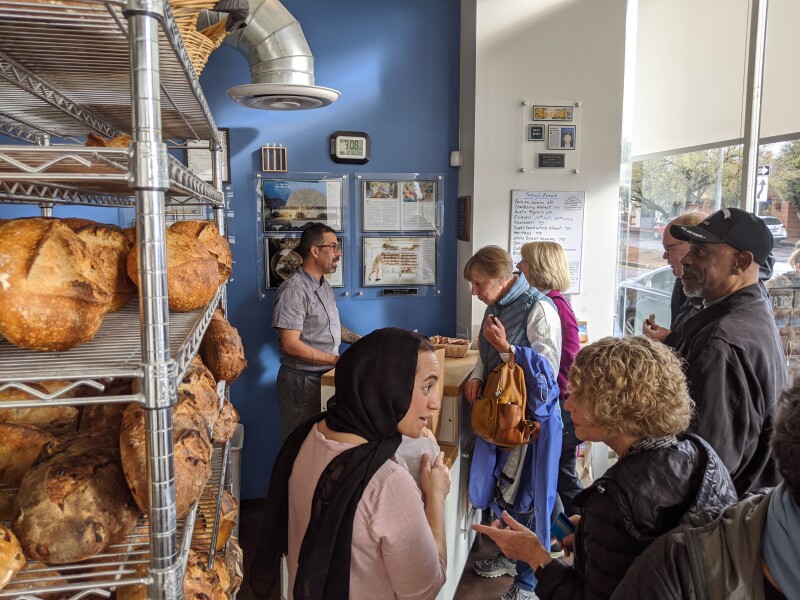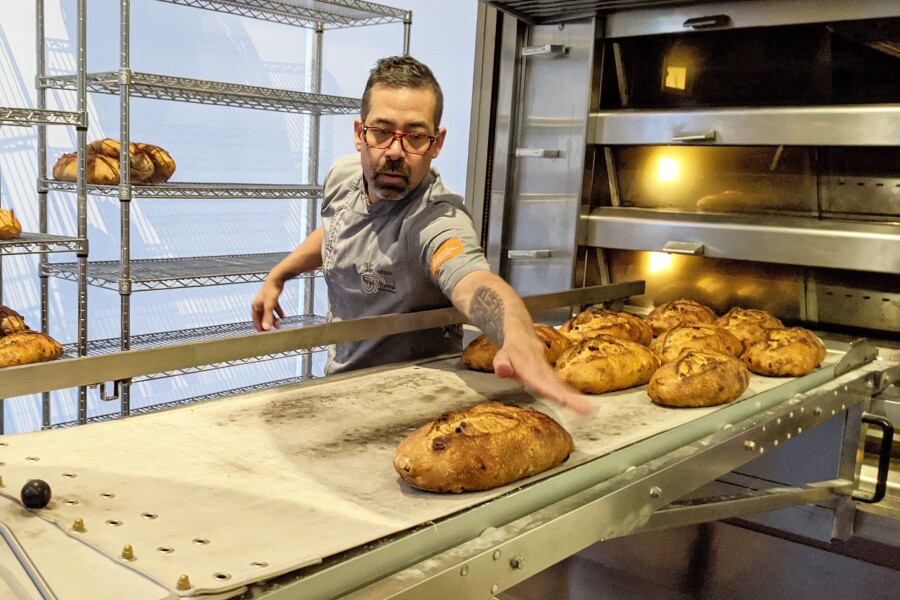At 7 a.m. on a Tuesday in Tucson, the sun hasn’t quite yet risen, and it’s overcast. Traffic is minimal on nearby Broadway Boulevard, and the only business with its lights on is a modest storefront: Barrio Bread. Inside, a four-tiered oven warms the shop; wheeled metal shelves of fresh bread make the small space feel even smaller. Framed press clippings and certificates hang on the wall, including one honoring owner and baker Don Guerra as a 2019 James Beard Foundation semifinalist for Outstanding Baker (he’s in the running again for 2020).
Before sliding Super Seed whole wheat loaves in to bake, Guerra deftly scores them, slicing through exteriors coated in sunflower, flax, and sesame seeds. Music plays from a speaker, and a dough mixer hums. The aroma of just-baked bread perfumes the air.
As Guerra removes the next batch of Super Seed loaves from their proofing baskets, a few plain, light-colored ones stand out. It’s a special batch: a collaboration with the brewers downtown at Ten55 Brewing Company. The loaves are made from the brewery’s “spent grain,” a by-product of the beer-brewing process. The grains themselves? Arizona-grown Gazelle rye and Red Fife grains from Hayden Flour Mills and BKW Farms, respectively, neither of which is more than 100 miles away from Barrio Bread.
These light-colored loaves are important—edible evidence that it’s not just about the bread at this artisanal bakery, with its accolades and morning smells. Instead, they’re representative of Don Guerra’s larger mission: to cultivate a more sustainable and engaged Tucson food community. Along the way, he’s transformed what it means to be a neighborhood bakery.

Left: A morning’s haul from Barrio Bread includes Einkorn, sesame, pain au levain, Heritage, and cranberry walnut loaves. Right: Don Guerra prepares Super Seed loaves for baking.
Photo by Sara Button (left) and Lisa Button (right)
A baker’s beginnings
A self-professed “carb kid” with an entrepreneurial spirit, Guerra grew up in Tempe eating his grandma’s homemade tortillas and his mom’s bread. But it wasn’t until he got a job in his early 20s at a little bakery in Flagstaff that he fell in love with bread-making. The more he worked and learned, the more baking developed into a passion.
“I love it. I’ll do anything for it,” he says. “It’s all the things I am as a person—art and science, then you tie in the physicality of it. You’re on your feet, you’re working hard. Then it’s the life skills: being mindful, being patient, being dedicated. Perseverance.”
By age 25, Guerra had opened his first bakery, the Village Baker, in Flagstaff; a few years later, his business had expanded to include another location in Ashland, Oregon. Quickly, though, he realized it was too much, too soon: Guerra, then just 28, was ill-equipped to handle 35 employees. He sold the company and returned to Tucson to get a teaching degree.
After graduating from the University of Arizona School of Education in 2001, Guerra began teaching at an elementary school. But he missed the craft and creativity of baking, and in 2009, after seven years in public education, he converted his garage into a home bakery and got a license to operate under the state’s cottage industry food laws.
When Guerra was starting his new bakery, bread made for locals from local grains wasn’t a big thing—but he sensed it could be. As the effects of the recession unfolded and the dearth of local supply chains became more apparent, Guerra knew he wanted his new bakery to help cultivate a strong grain economy for the region. “Instead of growing [Arizona grain] and shipping it away, wouldn’t it be cool to grow it here and feed your people?” he says.

Don Guerra sifts flour onto the saguaro cactus stencil of the Heritage loaves at Barrio Bread.
Photo by Lisa Button
Ancient grains, modern traditions
When people think of Arizona, they might conjure up images of saguaro cacti or the Grand Canyon. What they probably don’t think of is agriculture. But Tucson has the oldest agricultural history in the United States, a factor in its designation as a UNESCO City of Gastronomy in 2015—and wheat is part of that long history. The Old World grain first appeared in the Sonoran Desert as long ago as the mid-16th century, when Spanish explorers shared some wheat seeds. In the 1690s, as Jesuit missionary Father Kino traveled through Mexico, California, and Arizona distributing wheat extensively, it became a much more widespread crop. The desert climate worked well for the soft wheat variety, which thrived in the dry environment.
Wheat became an integral part of the area’s agricultural systems, but during the Green Revolution in the 1960s—a period that saw a boom in the development of high-yield cereal varieties and a transformation of irrigation and growth practices—local varieties like White Sonora started to disappear. Today, most of America’s wheat, especially the type that’s best for baking bread, comes from Great Plains states like Kansas and Montana. There, farmers grow a massive amount of “hard” wheats, which have higher protein and stronger gluten levels. Arizona’s status as a premier wheat growing region goes mostly unnoticed by Arizonans, despite the fact that about half of the state’s Desert Durum wheat gets exported—Italy has been buying it to make pasta for decades.
But Arizona’s potential didn’t go unnoticed by Guerra. He knew that forging relationships with Arizona farmers and investing in the state’s local grain economy would make for a stronger, greener regional economy at large. He also saw that he could help contribute to Tucson’s biodiversity and seed conservation efforts in conjunction with nonprofit organizations like Native Seeds/SEARCH. An added bonus? Ancient and heritage grains tend to be more nutritious than modern wheat variants due to their lack of hybridization. Not only could Guerra establish a bakery that was more sustainable than traditional models, but it would also be better for Tucson in practically every sense.
Grain expectations
With a vision in place, now Guerra had to execute it. He’d face a couple of obstacles, to be sure. Flavor, for one: Since he would be making some loaves from less typical grains, the bread would not all taste the same as what people were used to. Another was cost: Though Arizona is a fine place to grow wheat, these crops produce a much lower yield compared to others, which meant he would have to do more with less. It was an economy of scale question, too—the local farms are smaller and require more labor. Luckily, none of that stopped Guerra. “I’ve always been that kid if someone tells me, ‘No one has done that,’ I want to be the first,” he says.
Guerra didn’t plan to start with 100 percent local wheat flours; instead, he intended to get there gradually as local partnerships and flour supply grew. Like any good educator, he knew that the partnerships and supply would come from making a case: from showing Tucsonans why the efforts were valuable for the community and its food future. So he did. From the start, his business model has been wholly transparent; he’s held lectures and conducted workshops and posted recipes online and taught people to bake bread. He partnered with family-owned farms like BKW Farms in the town of Marana, just northwest of Tucson, and Hayden Flour Mills in Queen Creek, about 90 miles away. The bread he was making was also really good—and people kept buying it.
In 2015, a USDA Local Food Promotion Grant awarded Barrio Bread $100,000, which allowed Guerra to expand his collaborations and scale the bakery from his garage to the cozy storefront we were standing in that February morning.
Today, Barrio Bread operates five days a week. The shop sells four flour blends and a trio of grains, including White Sonoran, and sources bread to more than a dozen retailers and restaurants. Typically 35 bread specialties rotate on its menu, 70 percent of which are made with local grains (the ultimate goal is still to get to 100). On any given day at the bakery, you might see some familiar names—focaccia, pain au levain, baguettes—and not-so-familiar ones like Khorasan (a drought tolerant heritage grain with a nutty flavor) or Pan de Kino (a round loaf of White Sonoran wheat milled by BKW Farms, named in honor of the same Father Kino who was so instrumental in the wheat’s existence). Some breads pay visual homage to the state, too, like the Heritage loaf, which features an Instagram-worthy saguaro stencil and is made from a blend of local flours.
The loaf Guerra is most proud of, though, is the Einkorn. The world’s most primitive wheat, Einkorn is thought to be the first wheat humans gathered and cultivated about 10,000 years ago. Compared to other modern breads, it’s high in protein and low in gluten, making it easier to digest—but not very easy for bread-making. At Barrio, the dark brown loaf is a wide rectangle, big enough that they sell it in half and whole options. The flavor is slightly nutty, perfect for toasting and slathering with butter. Einkorn has been on Barrio’s menu for several years, at first made with flour sourced from Idaho and Oregon. But the loaves are now made from Einkorn grown by Hayden Flour Mills. The first crop came last fall.

Customers select and pay for their bread at Barrio on Tuesday, February 11.
Photo by Sara Button
A neighborhood bakery at its best
Before the bakery opens officially at nine o’clock, people in sweatshirts and windbreakers have already started to line up outside. Even after an employee unlocks the door and staff members assist customers as they enter, the line grows. In it are regulars like local Henry Grant, who likes the whole wheat sesame. (“It’s the best bread in town!” he proclaims.) First-timers wait their turn, too. Pat Flynn and Bob Nigbor, of Altadena, California, are in town for the city’s annual gem show; they had heard about the bakery and incorporated it into their trip planning. They’re on strict orders from friends to bring extra loaves back home to California.
Perhaps most encouragingly, Guerra’s decade-long efforts to educate his customers about Tucson’s grain economy have not gone unnoticed. “My husband was a wheat farmer, so when we found out [about the bakery’s relationship with regional wheat farms], this is where we come,” says part-time Oro Valley resident Colleen Kornkven as she and her husband, Bob, move closer to the morning’s prize: fresh loaves from Barrio Bread. “It doesn’t matter what day of the week we come, there’s always a line.” Visible through the window is a mustachioed employee in a beret retrieving loaves for a customer. Another Barrio Bread team member answers questions, and Don Guerra himself is on cash register duty. Even through the glass, it’s clear that Guerra has a warm rapport with his customers, repeat or not. “People come out with a smile on their face,” says Bob, as we stand in the February chill.
Just then, the door swings open. The aroma of just-baked bread wafts out, and a woman emerges. She holds a toddler in one arm and a brown paper bag of freshly made, community-supported local bread in the other—and, indeed, has a smile on her face.
Note: You can learn how to make artisanal bread at home with self-paced online baking lessons from Don Guerra. Use the code FLATTENTHECURVE to get 50 percent off the “How to Bake Whole Grain Sourdough Bread” course; the pizza dough class is free.
>>Next: Delicious Global Dishes and Drinks You Can Make at Home











